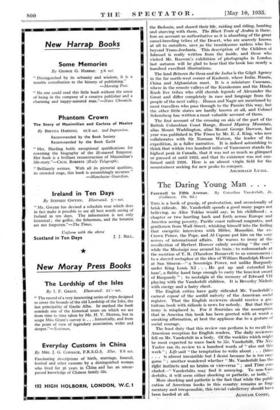The Daring Young Man . . .
Farewell to Fifth Avenue. By Cornelius Vanderbilt, Jr. (Gollanez. 10s. 6d.) Tins is a book of gossip, of protestation, and occasionally of brisk ridicule. Mr. Vanderbilt spends a good many pages not believing, as Alice Toklas would say, in his childhood ; a chapter or two hurtling bad: and forth acroas. Europe and America seeing poverty, Pacific coast railroad magnates, and gentlemen from Wall Street, whisking himself into the feeling that energetic interviews with Hitler, Mussolini, the ex- Crown Prince, the Pope, and Al Capone put him on the very nerves of international affairs. He warms to • irony at the recollection of Herbert Hoover calmly awaiting "the end" while the Mississipi rose around his train ; to rodomontade at the mention of T. R. (Theodore Roosevelt to us commoners) ; to a shrewd metaphor at the idea of William Randolph Hearst at San SimeOn—" a Sovereign Power, not unlike Burgundy under King Louis XI . ; He got up and extended his harm', a flabby hand large enough to carry the heaviest sword of Burgundy " ; to nostalgia at the memoryof Edward VII playing with the Vanderbilt children. It is Beverley Nichols with energy and a hairy chest.
The English critics have gaily ridiculed Mr. Vanderbilt's earnest expose of the sordid naivety of the American social register. That the English reviewers should receive a gra- tuitous book with ridicule is news for nobody. But that their irony is misplaced is. For it flourishes on the assumption that in America this book has been greeted with at worst a sneaking affirmation, at best the applause due to a gesture of social courage.
The least duty that this review can perform is to recall the American reception for English readers. • The daily reviewers fell on Mr. Vanderbilt in a body. Of the weeklies which might be most expected to wave back to Mr. Vanderbilt, The New Yorker ran its review to a hundred words of "also out this week "; Life said "the temptation to write about . . (him) . . is almost irresistible but I desist because he is too easy game " ; another wondered whether "Mr. Vanderbilt has the right instincts and no brains or vice•versa " ; and Time eon-
cluded—" Vanderbilts may find it annoying. To non-Vanderbilts, it will seem either shocking or pathetic, or both.','
More shocking and pathetic is the fact that while the publi- cation of American books in this country remains so frag- mentary and irresponsible, this trivial valedietory should have


































































 Previous page
Previous page